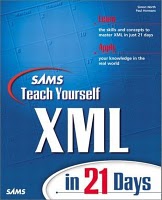
|
FreeComputerBooks.com
Links to Free Computer, Mathematics, Technical Books all over the World
|
|
- Title: Sams Teach Yourself XML in 21 Days
- Author(s) Steven Holzner
- Publisher: Sams; 3 edition (October 20, 2003)
- Paperback: 888 pages
- eBook: HTML and PDF
- Language: English
- ISBN-10: 0672325764
- ISBN-13: 978-0672325762
- Share This:

|
Sams Teach Yourself XML in 21 Days, written by expert author Steve Holzner, offers hundreds of real-world examples demonstrating the uses of XML and the newest tools developers need to make the most of it.
In Week One, he starts from basic syntax, and discusses XML document structure, document types, and the benefits of XML Schema. Week Two covers formatting using either CSS or the Extensible Sytlesheet Language, and working with XHTML and other tools for presenting XML data on the Web, or in multimedia applications. The final chapter of week two discusses XForms, the newest way to process forms in XML applications. Week Three applies XML to programming with Java, .NET or JavaScript, and building XML into database or Web Service applications with SOAP. Along the way, Steve shows readers the results of every lesson and provides both the "how" and "why" of the inner working of XML technologies.
About the Authors- Steven Holzner is an award-winning author who has written 80 computing books. He has been writing about XML since it first appeared and is one of the foremost XML experts in the United States, having written several XML bestsellers and being a much-requested speaker on the topic. He's also been a contributing editor at PC Magazine, has been on the faculty of Cornell University and MIT, and teaches corporate programming classes around the United States.

- Sams Teach Yourself XML in 21 Days (Steven Holzner)
- The Mirror Site (1) - PDF
- The Mirror Site (2) - PDF
- The Mirror Site (3) - PDF
-
 XML - Managing Data Exchange (Wikibooks)
XML - Managing Data Exchange (Wikibooks)
This book provides a detailed description of XML, its origins, its programming, and its uses on the Internet today. This book also provides exercises with which to test the knowledge you have gained through the deliberate study of its contents..
-
 Practical Transformation Using XSLT and XPath (G. Ken Holman)
Practical Transformation Using XSLT and XPath (G. Ken Holman)
This book is primarily a practical reference book for professional XSLT developers. It assumes no previous knowledge of the language, and many developers have used it as their first introduction to XSLT; however, it is not structured as a tutorial, and there are other books on XSLT that provide a gentler approach for beginners.
-
 Processing XML with Java: A Guide to SAX, DOM, JDOM, JAXP
Processing XML with Java: A Guide to SAX, DOM, JDOM, JAXP
A complete guide to writing Java programs that read and write XML documents. Shows developers how to save XML documents, read XML documents, communicate with network servers that send and receive XML data, and integrate XSLT into their programs.
-
 Programming XML with C# (Mahesh Chand)
Programming XML with C# (Mahesh Chand)
This book is a step-by-step tutorial for beginners and students who want to learn XML programming using C# language. It is recommended that you have some programming experience using any of the object-oriented languages such as C++, Pascal, or Java.
-
 A Technical Introduction to XML (Norman Walsh, et al)
A Technical Introduction to XML (Norman Walsh, et al)
This introduction to XML presents the Extensible Markup Language at a reasonably technical level for anyone interested in learning more about structured documents. In addition to covering the XML 1.0 Specification, this article outlines related XML specifications, which are evolving.
-
 Open XML Explained (Wouter van Vugt)
Open XML Explained (Wouter van Vugt)
In this book you will be provided a detailed overview of the three major markup languages in Open XML. This book is written for those who have a basic understanding of XML or HTML. It's for a software architect or developer who needs to build document-centric solutions.
-
 O'Reilly® DocBook 5: The Definitive Guide (Norman Walsh, et al)
O'Reilly® DocBook 5: The Definitive Guide (Norman Walsh, et al)
This book assumes a working knowledge of SGML, though basic concepts are described during the introduction. Later reference sections present a wide range of DocBook "entities." Character entities, codes used to describe diacritics and mathematical symbols, are also listed.
-
 The XML CD Bookshelf - 7 Bestselling Books
The XML CD Bookshelf - 7 Bestselling Books
This collection provides convenient online access to seven indispensable XML books - over 3,000 pages of useful reference and tutorials in a convenient format accessible from any web browser.





